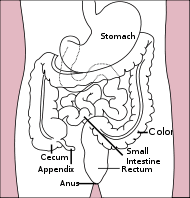GENERAL SURGERY
Gastrointestinal Surgery
COLON POLYPS
 The colon is a muscular tube that forms the last part of the digestive tract. Semi-liquid food waste (stool) from the small intestine enters the colon at the cecum (the beginning of the colon). As the stool moves through the colon, the colon absorbs water and stores the waste until it is passed out at the rectum.
The colon is a muscular tube that forms the last part of the digestive tract. Semi-liquid food waste (stool) from the small intestine enters the colon at the cecum (the beginning of the colon). As the stool moves through the colon, the colon absorbs water and stores the waste until it is passed out at the rectum.
In the lining of the colon, small fleshy clumps of tissue, called polyps, can form. Most polyps are benign (not cancerous), and cause no symptoms. However, over time, a polyp can change and become cancerous. The larger a polyp becomes, the higher chance it has of becoming cancerous. Most cases of colon cancer begin as polyps.
There are several kinds of polyps that can be identified, either by a doctor or in the lab. Polyps that are adenomatous are considered to be pre-malignant, meaning they will most likely become cancerous over time.
When a polyp becomes cancerous, growing abnormally, it may involve more tissue of the colon or rectum. Over time, the cancer can become metastatic, meaning it has spread to nearby organs or to glands called lymph nodes. The earlier a cancerous tumor is removed, the better chance of preventing its spread.
Whether you have polyps, or if you already have cancerous growths, the best treatment is to remove them.
Symptoms and Risk Factors for Colon Cancer
Symptoms of colon cancer include changes in bowel habits, blood in the stool, and persistent cramps, gas, or abdominal pain.
Risk factors for colon cancer include:
- Obesity.
- Radiation therapy for another cancer.
- Smoking.
- Age over 50 years.
- Sedentary life style.
- Personal or family history of cancer or polyps.
- Inflammatory diseases of the colon.
- Diabetes.
There is also some evidence that a low fiber/high fat diet may increase the risk of colon cancer.
Screening for Colorectal Polyps and Cancer
The best test doctors have for detecting abnormal growth in the colon is a colonoscopy. This test may be done at a surgery center or in the hospital on an outpatient basis. CT colonography, or virtual colonoscopy as it is commonly referred to, is a new imaging technique that is completed on a CT or MRI scanner. Both procedures require your colon to be cleansed for the test, so you will need to perform a “bowel prep” the day before. You will receive a bowel cleansing kit when you are scheduled for your exam.
Before a traditional colonoscopy, a nurse will start an IV in your hand or arm and give you a medication to relax you. You will not remember the examination. The doctor inserts a long, flexible, lighted tube called a colonoscope into your rectum. This scope allows the doctor to view the entire colon and if a polyp or abnormal growth is found, the doctor may be able to remove it right away. If the polyp cannot be removed due to size, location, or shape, then a sample will be taken and sent to the lab for biopsy .
A virtual colonoscopy does not require sedation and takes about 10 minutes to complete. The patient’s colon is inflated with air or CO2 and the abdomen is scanned. The 3D images created by the scanner are read by a radiologist. If a polyp is found you will be scheduled for a traditional colonoscopy so that the polyp can be removed or biopsied. If possible, the traditional colonoscopy is scheduled for the same day so the patient can avoid the preparation process again.
Colon Resection Surgery
A colon resection is surgery to remove part of your colon. During a colon resection, the surgeon removes (resects) the affected piece of colon and then sews the two new ends together in an anastomosis. The repair is designed to maintain your colon’s normal tube-like shape, so you can regain your normal bowel movements. Colon resection may be done as open surgery, with an incision down your belly, or laparascopically. In laparoscopic surgery, the surgeon makes 4 or 5 small incisions and inserts tiny instruments and a camera to perform the surgery while he or she watches it on a video screen. A gas is used to inflate the belly and lift the abdominal wall away from the internal organs. Your surgeon will determine which option is best for you.
Risks and Possible Complications of Colon Resection Surgery
- Infection.
- Injury to nearby organs.
- A connection (anastomosis) that leaks or separates.
- Possible colostomy.
- Risks from anesthesia.
- Blood clots.
